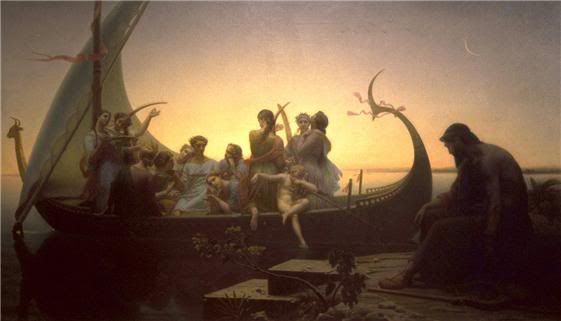M. Vinteuil, whose daughter is a lesbian, has a house along the Méséglise Way. Proust himself was a closeted homosexual, but he has written his narrator as heterosexual, an arrangement that will allow Proust to explore the place of homosexuality in a wider social context.
Here the reference to homosexuality is with regards to parental shame, ruin, and death. But while society blamed the daughter for her father's death (due, they said, to a broken heart), they also admitted that M. Venteuil continued to love his daughter very much, even allowing her supposed lover to live in their home. This would seem to make society, and its harsh judgement, actually to blame for Venteuil's demise.
"And yet however much M. Vinteuil may have known of his daughter's conduct it did not follow that his adoration of her grew any less." (pp.208-209)
"But when M. Vinteuil thought of his daughter and himself from the point of view of society, fromt he point of view of their reputation, when he attempted to place himself by her side in the rank which they occupied in the general estimation of their neighbours, when he was bound to give judgment, to utter his own and her social condemnation in precisely the same terms as the most hostile inhabitant of Combary; he saw himself and his daughter in the lowest depths, and his manners had of late been tinged with that humility, that respect for persons who ranked above him and to whom he now looked up" (p.209)There may also be a comparison drawn here between the fall of M. Vinteuil, due to his daughter being a lesbian, and the fall of Swann, due to his chosen wife being of dubious morals. Both have been cast out by a judgmental society.
Notable passages:
"On my right I could see across the cornfields the two chiselled rustic spires of Saint-André-des-Champs, themselves as tapering, scaly, chequered, honeycombed, yellowing and friable as two ears of wheat." (p.205) This makes me think of Proust's love for Ruskin, and Ruskin's fourth tenet, the one regarding beauty which says that architecture should draw from or reflect nature (post).
Cool stuff:
Xavier Boniface Saintine (p.206) was an 19th century French writer.
Marc-Charles-Gabriel Gleyre (p.206) was a Swiss artist who spent much of his life in France. The piece to which M refers is probably Lost Illusions, with the moon "silhouetted against the sky in the form of a silver sickle."


No comments:
Post a Comment